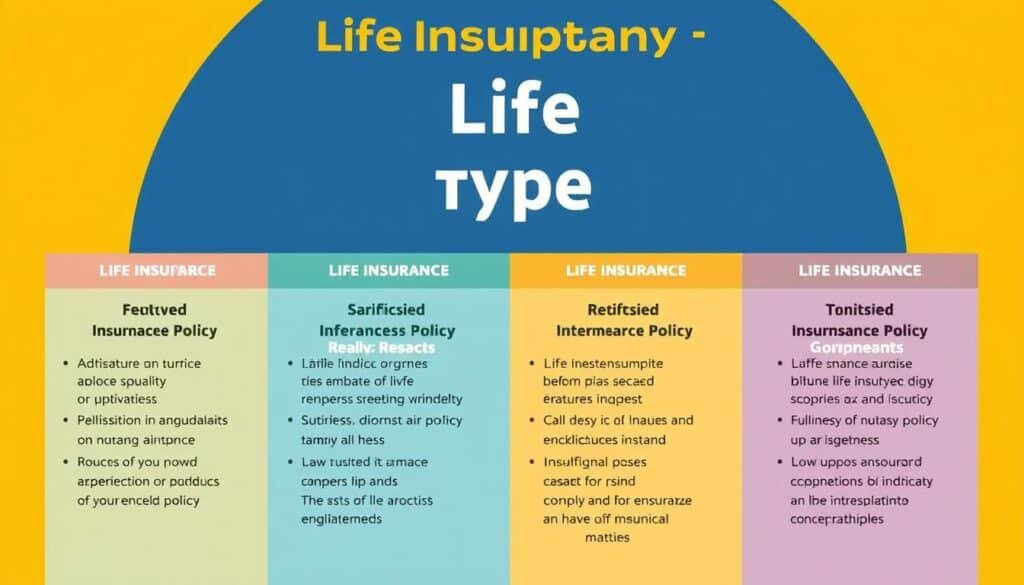Insurance is key to a solid financial plan. It helps you handle unexpected costs and protects your assets. It also covers expenses that could blow your budget. By using insurance, you move risks to an insurance company. This keeps your money safe and your family secure, even when things go wrong.
Having the right insurance means you’re covered if you can’t work because of sickness or injury. It also helps you reach your financial dreams.
Key Takeaways
- Insurance is a crucial component of a comprehensive financial plan.
- It helps manage financial risks, protect assets, and cover critical costs.
- The right insurance coverage can provide income replacement and support long-term financial goals.
- Transferring risks to an insurance company can safeguard your finances and family’s financial security.
- Choosing the appropriate insurance coverage is essential for securing your financial future.
The Importance of Insurance in Financial Planning
Insurance is key in financial planning. It helps manage risks and uncertainties in life. It acts as a safety net for your assets and prepares you for unexpected events.
Risk Management
Risk management is what insurance is all about. It shifts the cost of potential losses to an insurance company. This way, you protect your assets and keep your financial planning on track. It also helps you prepare for emergencies, letting you focus on your financial goals.
Asset Protection
Insurance protects your valuables from damage or loss. It covers the cost of fixing or replacing things like your home, car, or personal items. This means you won’t have to use your savings for repairs or replacements.
Covering Critical Costs
Insurance is crucial for covering medical expenses and other critical costs. Health insurance, for example, helps you handle unexpected illnesses or long-term care costs. This keeps your financial stability secure.
“Insurance is not just a safety net; it’s a foundation for financial success.”
Adding insurance to your financial planning strategy builds a strong safety net. It prepares you for the unexpected and lets you confidently chase your long-term goals.
Types of Insurance to Consider

Planning for your financial future means looking at different insurance options. These options can protect you and your family from many risks. They cover unexpected medical costs and help if you lose your job.
Health Insurance
Health insurance is a must-have today. It pays for doctor visits, hospital stays, and medicines. Without it, one accident or illness could lead to huge medical bills and financial trouble.
Life Insurance
Life insurance is key for your family’s financial safety. It covers funeral costs, debts, and helps replace your income if you pass away. This ensures your family is cared for.
Auto Insurance
Auto insurance is a must in most states. It covers repair costs, medical bills, and liability claims from car accidents. This insurance protects your assets and gives you peace of mind while driving.
Homeowners/Renters Insurance
Homeowners or renters insurance protects your stuff and home from damage, theft, or disasters. It helps you replace lost items and covers temporary housing if your home is not safe.
Disability Insurance
Disability insurance gives you money if you can’t work because of an injury or illness. It helps you keep up with bills and your lifestyle. This is very important if you depend on your job for your living.
Looking at these insurance types helps you make a strong financial plan. It covers many risks and protects your money, work, and family. Choosing the right insurance is key to a secure financial future.
Long-Term Care and Pet Insurance

Planning for your financial future means thinking about insurance for long-term care and your pets. Long-term care insurance covers nursing home care, assisted living, or in-home care as you age. This keeps your savings safe for other needs. Pet insurance helps manage vet bills, keeping your pets healthy without using up your savings.
The U.S. Department of Health and Human Services says a private nursing home room costs over $100,000 a year. Long-term care insurance can ease this cost, letting you stay independent and live well as you age. The American Pet Products Association notes that pet owners spend $800 to $1,500 a year on vet care, based on the pet’s size and health. Pet insurance can cover these costs, avoiding unexpected money troubles.
| Insurance Type | Average Annual Cost | Key Benefits |
|---|---|---|
| Long-Term Care Insurance | $2,100 (for a 55-year-old) |
|
| Pet Insurance | $500 (for dogs), $300 (for cats) |
|
Investing in long-term care insurance and pet insurance protects your financial future. It ensures you and your pets get the care and support needed. When looking at insurance options, make sure to consider these important choices.
Financing Your Insurance Premiums

Getting the right insurance is a smart move for your future, but figuring out how to pay for it is key. You have options like paying in cash or using premium financing. Each method has its own way of handling your payments.
Cash Payments
Paying with cash is the simplest way to cover your premiums. You can use your paycheck or savings for this. This method is easy to follow, but you’ll need to adjust your budget to fit the costs.
Liquidating Assets
If you have investments or property, you might sell some to get cash. This can help pay for your premiums. But, think about the taxes and how it might change your financial plans for the future.
Premium Financing
Premium financing is great for those with big estates. It uses your assets to pay for life insurance premiums without using up your savings. This is good for estate planning and can reduce tax implications later.
| Financing Method | Advantages | Considerations |
|---|---|---|
| Cash Payments |
|
|
| Liquidating Assets |
|
|
| Premium Financing |
|
|
Choosing how to pay for your insurance premiums depends on your finances, goals, and future plans. Knowing your options helps you pick the best one for you.
Reviewing and Optimizing Your Insurance Portfolio

As your life changes, it’s key to check and improve your insurance portfolio. Look at how your policies are doing, like changes in interest rates or policy details. This makes sure you get the best cost-effective coverage and strong policy guarantees.
Big life events, like getting married or starting a business, might mean you need to change your insurance. Doing an annual review of your insurance helps you see ways to improve your protection. It also helps your policies match your new goals.
To make the most of your insurance portfolio, check how your policies are doing and see if they fit your current life and financial plans. This way, you can save money and make sure you have the right policy guarantees for the future.
| Policy Type | Policy Performance | Optimization Opportunities |
|---|---|---|
| Life Insurance | Premiums have increased due to changes in health status | Consider policy conversion or adjusting coverage levels to maintain affordability |
| Homeowners Insurance | Deductibles are too high, leading to higher out-of-pocket costs | Evaluate options to lower deductibles and maintain appropriate coverage |
| Auto Insurance | Discounts have expired due to changes in driving history | Explore eligibility for new discounts or adjust coverage levels to optimize premiums |
Regularly checking and improving your insurance portfolio ensures your policies keep up with your changing financial goals. This helps you handle life’s changes with ease and secures your financial future.
Right Insurance: Tailoring Coverage to Your Needs

Insurance isn’t a one-size-fits-all solution. The right insurance coverage must match your unique financial situation and goals. Think about your assets, debts, dependents, and financial goals.
It’s key to match your insurance portfolio with your estate plan and legacy planning. This ensures your insurance helps protect your loved ones and keeps your wealth safe. A financial expert can help craft a customized insurance strategy. This strategy offers the right coverage and protection for your future.
Tailoring Coverage to Your Needs
When picking insurance coverage, consider these important factors:
- Individual needs: Your financial situation, including assets, debts, and dependents, should guide your choices.
- Financial goals: Your short-term and long-term financial aims, like saving for retirement or building wealth, should shape your insurance.
- Estate planning: Make sure your insurance and estate plan work together to protect your loved ones and keep your legacy safe.
| Coverage Type | Considerations | Benefits |
|---|---|---|
| Life Insurance | Immediate cash needs, income replacement, and personal financial goals | Provides financial security for your family, protects assets, and supports legacy planning |
| Disability Insurance | Potential loss of income, ongoing expenses, and long-term care needs | Ensures your financial obligations are met if you become disabled, keeping your savings safe |
| Homeowners/Renters Insurance | Asset protection, liability coverage, and replacement costs | Safeguards your home and belongings, giving you peace of mind and financial stability |
By customizing your insurance coverage for your individual needs and financial goals, you can build a solid plan. This plan protects your assets, secures your future, and supports your estate plan and legacy planning.
Determining the Appropriate Life Insurance Coverage

When figuring out the right life insurance coverage, think about more than just your income. Your life insurance needs cover more than just making sure your family has money. They also include helping with important financial goals for your loved ones.
Immediate Cash Needs
If you pass away, your family might need cash for things like funerals and paying off debts. Make sure your life insurance coverage has enough money to pay for these costs. This way, it helps your family during a hard time without adding to their financial stress.
Ongoing Income Replacement
Your life insurance should aim to replace your income. This helps keep your family’s lifestyle the same. Think about your current income and any future earnings you expect. This will help you figure out how much income replacement your policy needs.
Personal Financial Goals
Look at your personal financial goals, like saving for your kids’ college or planning for retirement. Your life insurance coverage can help achieve these goals, even if you’re not there.
By carefully looking at your life insurance needs, you can get the right coverage. This protects your family’s financial future and gives you peace of mind.
Choosing the Right Type of Life Insurance

Choosing the right life insurance is key to protecting your family’s future. There are different types like final expense whole life, term, and permanent insurance. Each has its own benefits for various needs and budgets. Knowing what each offers helps you pick the best one for your goals.
Final Expense Whole Life Insurance
Final expense whole life insurance is a simple, affordable way to cover end-of-life costs. This includes funeral expenses and debts. It offers lifetime coverage and a guaranteed death benefit. This makes it a good choice for those wanting debt protection and peace of mind for their families.
Term Life Insurance
Term life insurance is great for temporary needs like income replacement and debt protection. It covers you for a set time, usually 1 to 30 years, and has lower premiums than permanent insurance. It’s perfect for young families and people with short-term financial goals.
Permanent Life Insurance
Permanent life insurance, like index universal life, gives you lifelong coverage and lets you build cash value. This can be used during your life. It’s a smart choice for retirement planning and building wealth, making it popular for a full financial plan.
Understanding each type of life insurance helps you pick the right one for your goals. Whether it’s debt protection, income replacement, or retirement planning, you can find the best policy for you.
Working with Financial Professionals

Working with financial professionals and insurance advisors is key to securing your financial future. They have the knowledge to guide you through the complex world of insurance and financial planning. They offer financial guidance and personalized solutions that fit your needs.
Financial experts do a deep insurance needs assessment to understand your situation. They look at your assets, debts, and goals. Then, they create a plan that makes sure your insurance meets your needs.
“A good financial professional can be the difference between a secure financial future and one filled with uncertainty.”
Working with financial professionals means your insurance will protect your assets and manage risks. They help you make smart choices to secure your financial future.
- Assess your current insurance needs and coverage
- Identify any gaps or areas for improvement in your insurance portfolio
- Explore different insurance options and their potential benefits
- Develop a customized insurance strategy that aligns with your financial goals
- Regularly review and optimize your insurance coverage as your life circumstances change
With financial professionals by your side, you can confidently handle insurance and financial planning. They make sure your insurance needs assessment and insurance portfolio optimization fit your life and secure your financial future.
Also Read : How To File A Home Insurance Claim Successfully
Conclusion
Adding the right insurance to your financial plan is key to a secure future. It helps manage risks from unexpected events, protects your assets, and covers important costs. By choosing the right policies for your health, life, auto, and home, you create a safety net.
This safety net gives you financial stability and peace of mind. It’s important to check and adjust your insurance often. Working with a financial expert can also help you understand insurance and planning better.
Having the right insurance is crucial for your financial security. It lets you manage risks, protect your assets, and prepare for future costs. This way, you can secure your financial future and protect your loved ones.
FAQs
Q: What types of insurance products should I consider to secure my financial future?
A: To secure your financial future, consider a wide range of insurance products including home insurance coverage, car insurance, life insurance, and health insurance. Each product plays a vital role in protecting your financial interests.
Q: How can I contact the right insurance agency for my needs?
A: You can contact us through our website or via phone to speak to an insurance agent. Our agents are dedicated to helping you find the best insurance solutions tailored to your needs.
Q: What should I do if I need to file a claim with my insurance group?
A: If you need to file a claim, contact your insurance agent or the claims department of your insurance group. They will guide you through the necessary steps to ensure your claim is processed efficiently.
Q: How can I get a quote for insurance products?
A: You can get a quote by visiting our website and filling out a quick form, or you can call us directly to speak with an insurance agent who can assist you.
Q: Why is it important to work with an independent insurance agency?
A: Working with an independent insurance agency allows you to access a broader range of insurance products and options from various carriers. This means you can find the coverage that best fits your needs at the right price.
Q: What should I consider when choosing the right insurance options for my home?
A: When choosing insurance options for your home, consider factors such as coverage limits, deductibles, and additional endorsements. It’s important to protect your home and its contents adequately.
Q: Can I insure my pets, and how does that work?
A: Yes, you can insure your pets through specific insurance products designed for pets. These policies can cover veterinary expenses, accidents, and illnesses. Contact an insurance agent for more details on pet insurance options.
Q: What are the recent articles available on your website related to financial security?
A: You can find a range of recent articles on financial security and insurance solutions in our “recent articles” section. These articles provide valuable insights and tips on how to manage your insurance needs effectively.
Q: How do I get in touch with your offices in Tucson and Sierra Vista?
A: You can get in touch with our offices in Tucson and Sierra Vista by visiting our website for the office address or by calling us directly. Our friendly staff is ready to assist you with your insurance needs.
Q: What is the best way to ensure my vehicle is adequately insured?
A: The best way to ensure your vehicle is adequately insured is to review your coverage options with an insurance agent, considering factors like liability, collision, and comprehensive coverage. This ensures you are fully protected while driving.
Source Links
- https://www.corebridgefinancial.com/insights-education/safeguarding-the-future
- https://www.usbank.com/wealth-management/financial-perspectives/financial-planning/insurance-financial-plan.html
- https://www.vectrabank.com/personal/community/two-cents-blog/A-Guide-to-Insurance-in-Financial-Planning/






